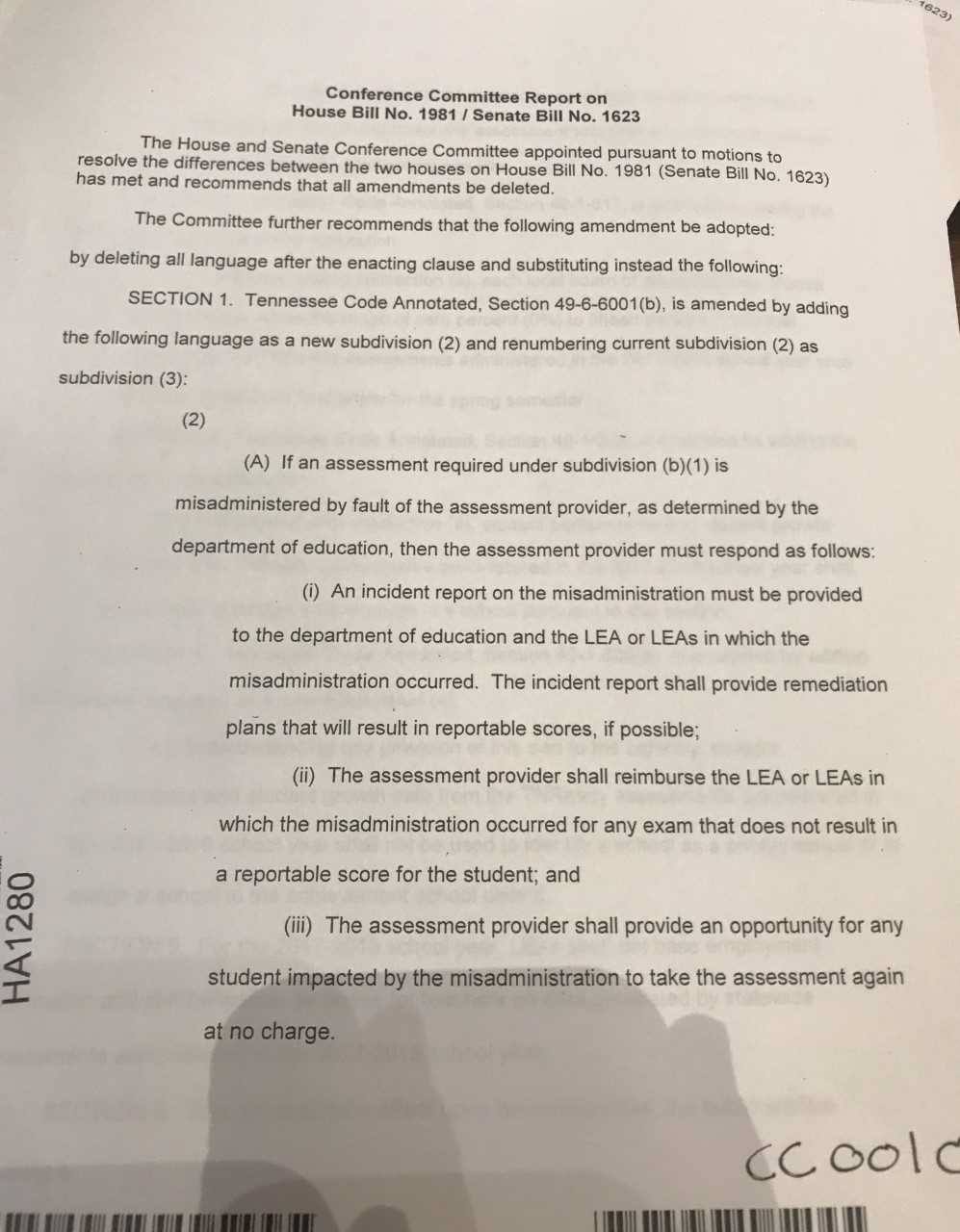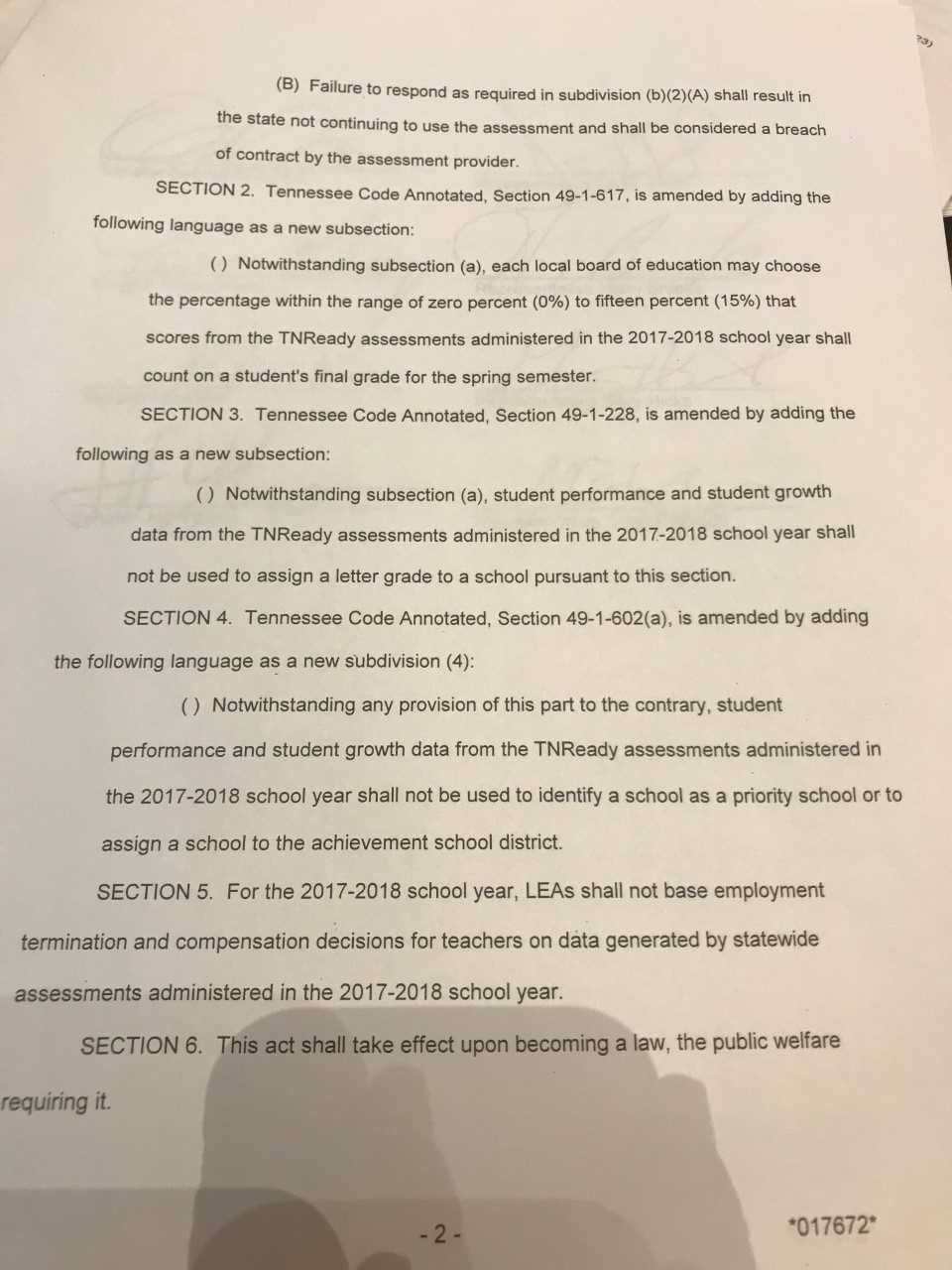After a fourth day of TNReady trouble, the Tennessee General Assembly took action today to make changes to how the test impacts schools, students, and teachers.
While some are billing the report of a joint committee of the House and Senate as a “hold harmless” for schools, students, and teachers, that’s not entirely accurate.
Also, the legislature stopped short of putting a stop to TNReady entirely, claiming federal law “requires” them to test students.
Here’s the deal: Federal law does say that districts should administer tests to at least 95% of students and that states should test all students in reading and math from grades 3-8 and at least once in high school, with a suggestion for additional high school testing as appropriate.
BUT: Is there really a penalty for districts (or states) where the testing threshold falls below 95%?
As I reported in 2016, the last time we had a major failure of online testing in Tennessee:
There’s just one problem: The federal government has not (yet) penalized a single district for failing to hit the 95% benchmark. In fact, in the face of significant opt-outs in New York last year (including one district where 89% of students opted-out), the U.S. Department of Education communicated a clear message to New York state education leaders: Districts and states will not suffer a loss of federal dollars due to high test refusal rates. The USDOE left it up to New York to decide whether or not to penalize districts financially.
In other words, the likelihood of a single Tennessee district losing funds due to stopping a test that isn’t working is very close to zero. Tennessee is not having problems due to opt-outs or a low number of students being tested. Kids in districts across the state are showing up for a test that is not happening. Districts are doing everything right and a vendor and the Tennessee Department of Education are failing to serve students. Unless TNDOE is going to fine districts, there is truly no risk of funds being lost.
Now, about the “hold harmless” law (pictured below):
- The law does say that districts and schools will not receive an “A-F” score based on the results of this year’s test. It also says schools can’t be placed on the state’s priority list based on the scores. That’s good news.
- The law gives districts the option of not counting this year’s scores in student grades. Some districts had already said they wouldn’t count the test due to the likelihood the scores would arrive late. Now, all districts can take this action if they choose.
- The law says any score generated for teachers based on this year’s test cannot be used in employment/compensation decisions.
Here’s what the law didn’t say: There will be NO TVAAS scores for teachers this year based on this data.
Commissioner McQueen said yesterday that the data from these tests will be used to generate a TVAAS score and it will count for 20% of a teacher’s evaluation. This law does NOT change that. It just says if you get a low score based on this number, you can’t be fired or denied compensation.
Below is an excerpt from current law (taken from TCA 49-1-302, the section governing teacher evaluation):
(E) For teachers with access to individual data representative of student growth as specified in subdivision (d)(2)(B)(ii), the following provisions shall apply:
- (i) In the 2016-2017 school year, the evaluation criteria identified in subdivision (d)(2)(B)(ii) shall be adjusted so that student growth data generated by assessments administered in the 2016-2017 school year shall account for ten percent (10%) of the overall evaluation criteria identified in subdivision (d)(2)(B);
- (ii) In the 2017-2018 school year, the evaluation criteria identified in subdivision (d)(2)(B)(ii) shall be adjusted so that student growth data generated by assessments administered in the 2016-2017 and 2017-2018 school years shall account for twenty percent (20%) of the overall evaluation criteria identified in subdivision (d)(2)(B);
- (iii) In the 2018-2019 school year and thereafter, the student growth component of the evaluation criteria shall be determined under subdivision (d)(2)(B)(ii);
- (iv) The most recent year’s student growth evaluation composite shall account for the full thirty-five percent (35%) of growth data required in a teacher’s evaluation if such use results in a higher evaluation score;
-
(v) For the 2015-2016 through 2017-2018 school years, student growth evaluation composites generated by assessments administered in the 2015-2016 school year shall be excluded from the student growth measure as specified in subdivision (d)(2)(B)(ii) if such exclusion results in a higher evaluation score for the teacher or principal. The qualitative portion of the evaluation shall be increased to account for any necessary reduction to the student growth measure.
Here’s what this means: If the current tests give you a “good” evaluation score, it will count for 35% of your total evaluation. If the score is not “good,” it only counts for 20% this year. The legislation adopted today by way of the Conference Committee does NOT change that.
In other words, the test data from the 2017-18 administration of TNReady WILL count in a teacher’s evaluation.
Here’s why that matters: An educator’s evaluation score factors into the number of observations they have each year as well as Professional Development Points (PDPs). PDPs are needed for license advancement or renewal.
The Department of Education addresses PDPs and notes:
| Overall level of effectiveness rating (approved TN model) |
Overall Score of 5 = 20 PDPs
Overall Score of 4 = 15 PDPs
Overall Score of 3 = 10 PDPs |
Information is maintained by the department. No additional documentation is required; points may be accrued annually. |
Even if this year’s scores only end up counting 20%, that’s enough to change a teacher’s overall TEAM rating by a level. A TEAM score below a three means no PDPs, for example. The overall TEAM score also impacts the number of observations a teacher has in a year — which also places an additional burden on administrators.
Also, districts now have to meet to decide how to handle the tests and student grades. For some, that decision has already been made. For others, this will require a meeting in pretty short order to let students, parents, and teachers know what’s happening.
Here’s the language of the conference committee report:


For more on education politics and policy in Tennessee, follow @TNEdReport
Your support is appreciated and helps keep content like this coming!






